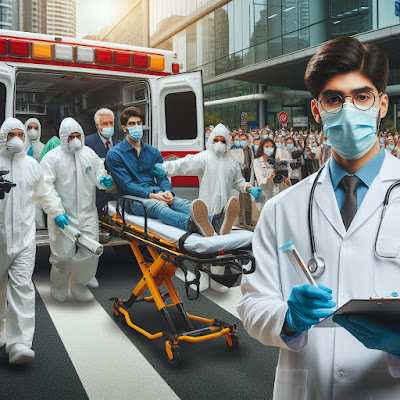Introduction:
In today's interconnected world, public health emergencies can strike at any moment, challenging our communities and testing our resilience. From infectious disease outbreaks and natural disasters to environmental crises and global pandemics, these emergencies can have far-reaching impacts on individuals, families, and societies. In the face of uncertainty, preparation is key, and knowledge is power. Join us as we explore the importance of preparedness and resilience in navigating public health emergencies, equipping you with the tools and resources needed to safeguard yourself and your loved ones in times of crisis.
 |
| Health Emergencies |
Understanding Public Health Emergencies:
Public health emergencies encompass a wide range of events that pose a serious threat to the health and safety of populations. These emergencies can include infectious disease outbreaks such as influenza, Ebola, or COVID-19, natural disasters like hurricanes, earthquakes, or wildfires, bioterrorism incidents, environmental hazards such as air pollution or contaminated water, and other health crises that require a coordinated response from public health authorities and communities.Preparedness Planning:
Preparation is essential for effectively responding to public health emergencies and mitigating their impact. Develop a comprehensive preparedness plan for yourself and your family, including emergency communication strategies, evacuation routes, and provisions for food, water, and medical supplies. Stay informed about potential hazards in your area and familiarize yourself with local emergency response protocols and resources. By taking proactive steps to prepare for emergencies, you can minimize risks and protect your health and well-being.Stay Informed:
Knowledge is power during times of crisis. Stay informed about emerging public health threats and developments through trusted sources such as government agencies, public health organizations, and reputable news outlets. Follow official guidance and recommendations from health authorities, and be vigilant for updates and advisories related to public health emergencies in your community. By staying informed and aware, you can make informed decisions and take appropriate actions to protect yourself and others.Practice Good Hygiene:
Maintaining good hygiene practices is crucial for preventing the spread of infectious diseases during public health emergencies. Wash your hands frequently with soap and water for at least 20 seconds, especially after coughing, sneezing, or touching potentially contaminated surfaces. Use hand sanitizer with at least 60% alcohol when handwashing facilities are not available. Practice respiratory etiquette by covering your mouth and nose with a tissue or your elbow when coughing or sneezing, and avoid close contact with individuals who are sick.Support Mental Health:
Public health emergencies can take a toll on mental health and well-being, causing stress, anxiety, and uncertainty. Prioritize self-care and mental health during times of crisis, and seek support from friends, family, and mental health professionals if needed. Maintain routines, engage in activities that bring you joy and relaxation, and practice mindfulness and stress management techniques to cope with challenging emotions. Remember that it's okay to ask for help and lean on others for support during difficult times.







